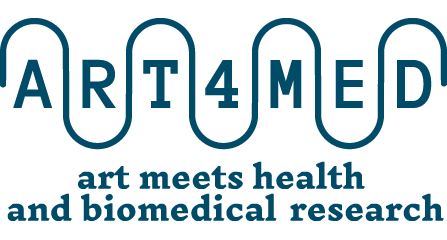m/other: arts of repair
A collective research project on reproductive justice and mental health.
The research project m/other: arts of repair looks at the potentials for artistic approaches to open up public conversations around reproductive justice and mental health. The project highlights questions of care and trauma for minoritized bodies, and centers BIPOC voices around experiences and encounters with the health system in general, and reproductive practices in particular.
The project is situated within an abandoned hospital ward in an otherwise functional psychiatric hospital, and is housed by the Center for Arts and Mental Health – an organization that works with implementing artist-led workshops and creative writing groups within the psychiatric system as alternative routes to recovery. During the residency, Laboratory for Aesthetics and Ecology will curate and organize artistic and public interventions in the hospital space such as performances, workshops and public talks.
From the vantage of autobiographical archives, artists Luiza Prado and Edna Bonhomme will chart reproductive and medical geographies and produce artworks that speak to experiences of diaspora, health inequities and racialized violence in medical histories. Artist and independent researcher Nazila Ghavami Kivi will conduct a series of workshops titled HAWWA: Health, reproductive justice and well-being among minoritized women and qtbipoc. In these workshops, Kivi facilitates mixed-methods writing exercises on reproductive health and reproductive justice with emphasis on memory work, creative writing and relatable, real-life theoretical discussions. Memory work was developed by Frigga Haug (1987) and further developed by Bronwyn Davies (Davies et al. 2001) in their work on deconstructing and reanalyzing gender. It is an auto-biographical/-ethnographic method designed to capture the embodied experiences and narratives of becoming a subject in the world. It was developed as a collective research methodology but is today used in education, research and artistic practices. In these workshops, health is understood in its broadest definition according to WHO “as a state of complete physical, mental and social well-being and not merely the absence of disease or infirmity” (WHO, 1994).
The curatorial residency projekt m/other: arts of repair explores questions of how to (re)inhabit broken institutional spaces of healing and form public conversations around gendered carework and precarity, and how to approach questions of social justice and racial inequity within the health system by means of collective creative practices.
m/other: arts of repair facilitates encounters between artists, patients, health care professionals and the general public, which will result in various co-produced texts and other artistic materials to be disseminated and made public within hospital settings, doctor’s offices and other health-related spaces,
The project is curated by The Laboratory for Aesthetics and Ecology and sees collaborations with artist and researcher Nazila Ghavami Kivi, chief psychiatrist Birgit Bundesen, artists Luiza Prado and Edna Bonhomme, The Center for Arts and Mental Health (CPH) and ARIEL – Feminisms in the Aesthetics (CPH)
artists: EDNA BONHOMME & LUIZA PRADO
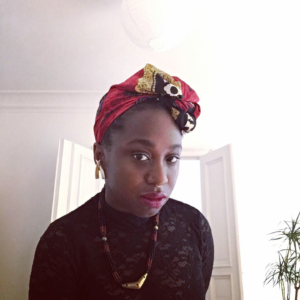
© Edna Bonhomme
Edna Bonhomme is a writer, historian of science, and interdisciplinary artist. As a researcher, Edna’s work iwho interrogates contagion, epidemics, and toxicity through decolonial practices and African diaspora worldmaking. A central question of Edna’s work asks: What makes people sick? Edna answers this by exploring the spaces and modalities of care and toxicity that shape the possibility for repair. dna’s creative work is guided by decoloniality, care, and African diaspora world making. Edna has written for publications such as Africa is a Country, Al Jazeera, analyse & kritik, The Baffler, Der Freitag, The Nation, The New Republic, and more. Edna holds a PhD in the History of Science from Princeton University and a Master’s in Public Health from Columbia University. Edna has collaborated on and exhibited multimedia projects at Haus der Kulturen der Welt, Galerie im Turm, Display Gallery, HAU Berlin, Savvy Contemporary, and other interdisciplinary spaces.
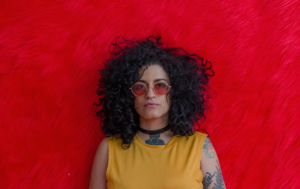
© Luiza Prado
Luiza Prado de O. Martins (she/her, they/them) is an artist and researcher born in Rio de Janeiro in 1985, four hundred and eighty-five years after the Portuguese first invaded the land currently known as Brazil. Luiza holds an MA from the Hochschule für Künste Bremen and a PhD from the Berlin University of the Arts and is a founding member of the Decolonising Design platform. Her work examines themes around fertility, reproduction, coloniality, gender, and race. In her doctoral dissertation she approaches the control over fertility and reproduction as a foundational biopolitical gesture for the establishment of the colonial/modern gender system, theorizing the emergence of ‘technoecologies of birth control’ as a framework for observing—and resisting, disrupting, troubling—colonial domination. Her ongoing artistic research project, “A Topography of Excesses,” looks into encounters between human and plant beings within the context of herbalist reproductive medicine, approaching these practices as expressions of radical care. Since 2019, she has broadened the scope of this research, developing a body of work that offers a critique of the racist concept of ‘overpopulation’ in the context of the current climate crisis.
co-organizer: LABAE
 Laboratory for Aesthetics and Ecology is a platform for planetary becomings.
Laboratory for Aesthetics and Ecology is a platform for planetary becomings.
We work with the embodied, theoretical and political implications of global, but unequally distributed environmental breakdown in response to multispecies worlds in urgent need of regeneration and care.
We try to stay with the trouble of cultivating human and more-than-human relations and ethics that point towards and rework the different response-abilities ‘we’ carry on a planet wounded by the violence of colonialism, white imperialism and extractive capitalism, while also reconfiguring the already exclusive and non-innocent notion of the Human. We work with the non-binary, the weird and the marginalized, the exhausted, the composting, the failing, the falling, the floating and the leaking. We strive to facilitate openings for the mourning of past, present and future worlds lost, while also holding space for radical joy, insurgent play and modest hope. We work towards the composing of collectives, resilient and vulnerable, in the ambition to imagine and co-create liveable worlds otherwise. We are concerned with the im/possibilities of queer homebuilding in a world characterized by forced migration and homelessness, and we long for the consolidation of international solidarity and practices care.
We facilitate a myriad of multidisciplinary events, exhibitions, workshops and symposia across landscapes, disciplines, contexts and histories spanning from rural spaces, festival sites, ocean shores, boats, academic- and exhibition spaces and more. Our methods are performative, experimental and flow through and across genres. We aim for long durational, cross-pollinating knowledge productions in conversation with many partners.
We also run a small press that publishes and translates work that shares, extends, supports and forms our thinking. Our publications explore intersections and crossings between the poetic and the academic, the affective and the scientific, the personal and the political.
research partner: THE CENTER FOR ARTS AND MENTAL HEALTH (Copenhagen)
 The Center for Arts and Mental Health, Copenhagen (Foreningen Kunst og Mental Sundhed, fkms) is a community-based multi-arts center aimed at providing opportunity for psychiatric service users to work with professional artists in developing and participating in artistic workshops and curatorial projects as spaces for healing and recovery focusing on meaningfulness, interconnectedness, de-institutionalization and care.
The Center for Arts and Mental Health, Copenhagen (Foreningen Kunst og Mental Sundhed, fkms) is a community-based multi-arts center aimed at providing opportunity for psychiatric service users to work with professional artists in developing and participating in artistic workshops and curatorial projects as spaces for healing and recovery focusing on meaningfulness, interconnectedness, de-institutionalization and care.
In the mental health care system it has become apparent that medicine alone cannot cure mental illness and that treatment should be more person-centered including a fuller conception of what it means to be a human being opening up the dialogue with social, existential but also aesthetic needs.
The Center for Arts and Mental Health is a result of an identified need in the mental health care system for more holistic approaches to treatment of mental illnesses, that for the last 30 years in main-stream psychiatry has been dominated by a reductionist, bio-pharmaceutical approach. Yet, the connection between art and mental health has been present since the birth of psychiatry for both therapeutic and diagnostic means. This connection has been valuable for psychiatry, but also for the arts.
The Center for Arts and Mental Health is working in close collaboration with Mental health care center Amager in Copenhagen, where psychiatry-users are offered participation in art-groups as part of their psychiatric treatment. The center also runs a research-program consisting of an interdisciplinary team of psychiatrists, philosophers, artists and service-users investigating the effects of art on mental health. The leading board of the center is cross-sectional and consists of established psychiatric researchers as well as art professionals.
associated partner: ARIEL - FEMINISMS IN THE AESTHETICS
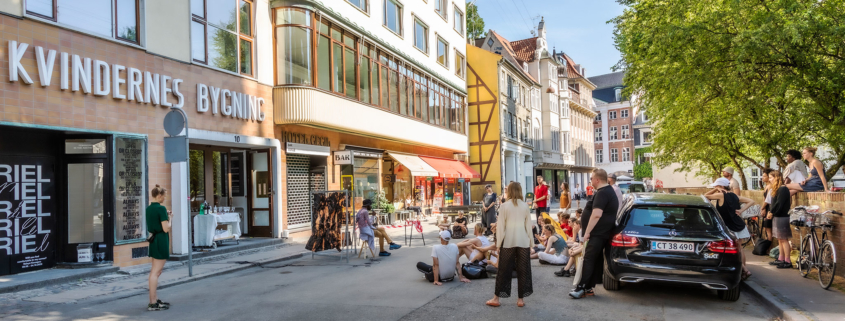
© LABAE / ARIEL
ARIEL – FEMINISMS IN THE AESTHETICS is an intersectional, queer-feminist exhibition platform and interface project situated within the Womens’ Building, Copenhagen. Providing a context driven framework for transdisciplinary cross-pollinating collaborations, ARIEL is expanding and challenging new ramifications of feminism, aiming to support and build lasting infrastructures of care and solidarity.
ARIEL – FEMINISMS IN THE AESTHETICS is a platform and interface for exhibitions, centered on new ramifications of feminism emerging within the aesthetic field. Through a facilitation of current artistic research, the project seeks to nuance and expand on a feminist framework with an attention to intersectional, transnational and transgenerational approaches and to be a contact zone where the topics can be accessed. The initiative is internationally oriented with a long-term perspective on branching out into new collaborations, contexts and situations.
Supported by Kvindernes Bygning (The Women’s Building), ARIEL’s platform is located on the ground floor of the building, where an exhibition program is available to the public 24/7. ARIEL builds on the early feminist work done by Kvindernes Bygning, and aims to reimagine and mobilize a transdisciplinary intersectional environment that can reflect and support the many initiatives and organizations within the building. ARIEL is initiated by Nina Wöhlk, and curated and run together with Karen Vestergaard Andersen.Toggle Content goes here
scientific collaborator: Birgit Bundesen
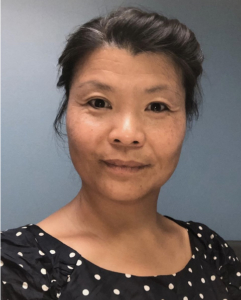 MD, psychiatrist. BA in comparative literature and senior consultant at Mental Health Care Center Amager, Copenhagen.
MD, psychiatrist. BA in comparative literature and senior consultant at Mental Health Care Center Amager, Copenhagen.
Bundesen is head of the research programme REWRITALIZE, and initiator and director of Center for Arts and Mental Health, an community based arts centre run by psychiatry users, artists, curators and fiction authors who develop and run participatory art groups led by professional artists in collaboration with mental health-care co-therapists offered as adjuvant psychiatric treatment.
Bio-artist: Nazila Kivi
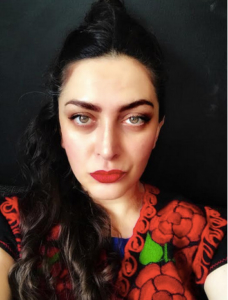 Nazila Kivi holds an M.A. in Cultural Encounters and Communication from Roskilde University and a B.Sc. in Public Health with Gender Certificate from Copenhagen University.
Nazila Kivi holds an M.A. in Cultural Encounters and Communication from Roskilde University and a B.Sc. in Public Health with Gender Certificate from Copenhagen University.
She has worked with Sex Education and Diversity for more than 10 years. She had a research year in Social Medicine focusing on reproductive health for minorities in pregnancy and childbirth, and works with the intersections of language, culture and equity. Public speaker on diversity and equity on ethnic minorities and LGBTQA+
She is a Literary critic in Danish daily Politiken and translator of literary fiction from Persian and English to Danish, as well as a frequent essayist on subjects regarding gender, maternity and reproductive justice.
